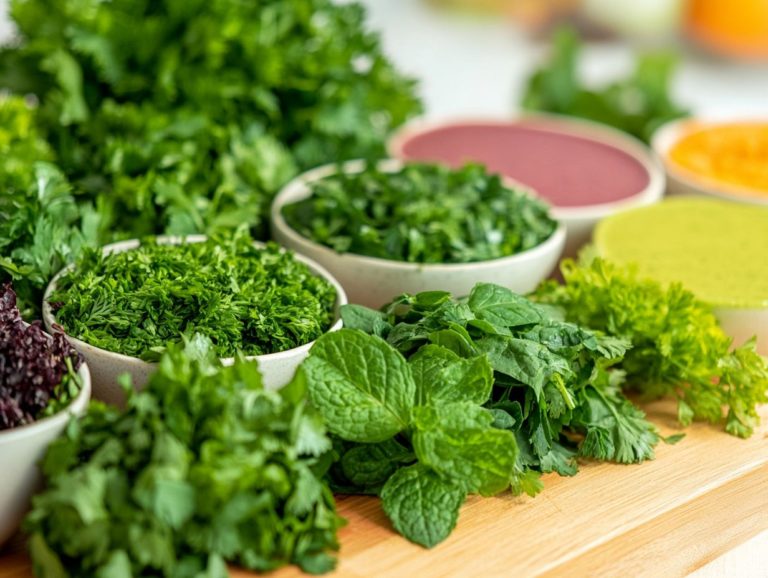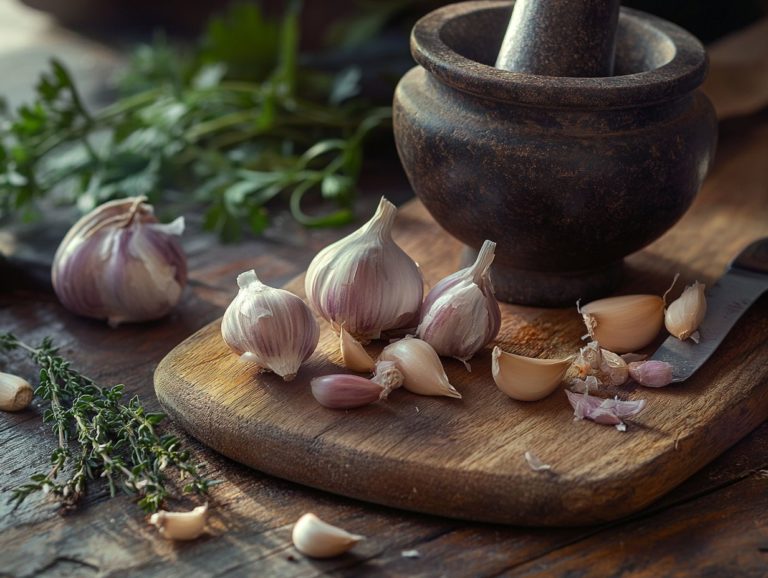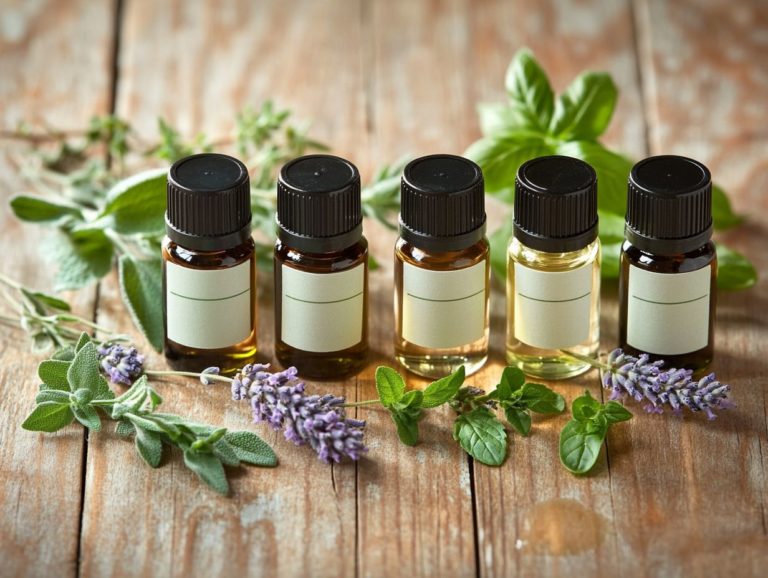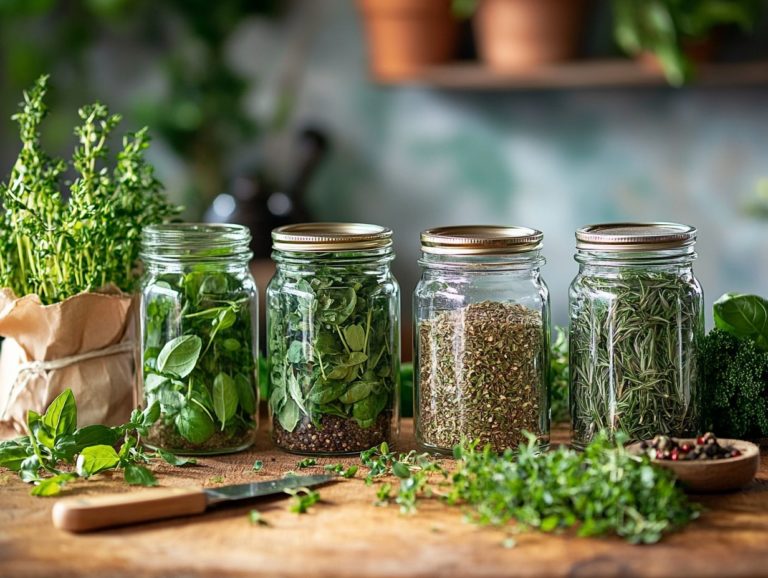5 Essential Herbs for Digestive Health
Struggling with digestive issues can feel like an uphill battle. But the good news is that nature provides powerful remedies right in your kitchen.
This article delves into five essential herbs ginger, peppermint, fennel, chamomile, and turmeric that can support your digestive health in numerous ways. From soothing discomfort to alleviating bloating, these herbs have been treasured for centuries for their remarkable benefits.
You ll learn how to seamlessly incorporate them into your diet, the recommended dosages, potential side effects, and additional health advantages.
Discover how these herbal allies can elevate your digestive wellness to new heights!
Contents
Key Takeaways:
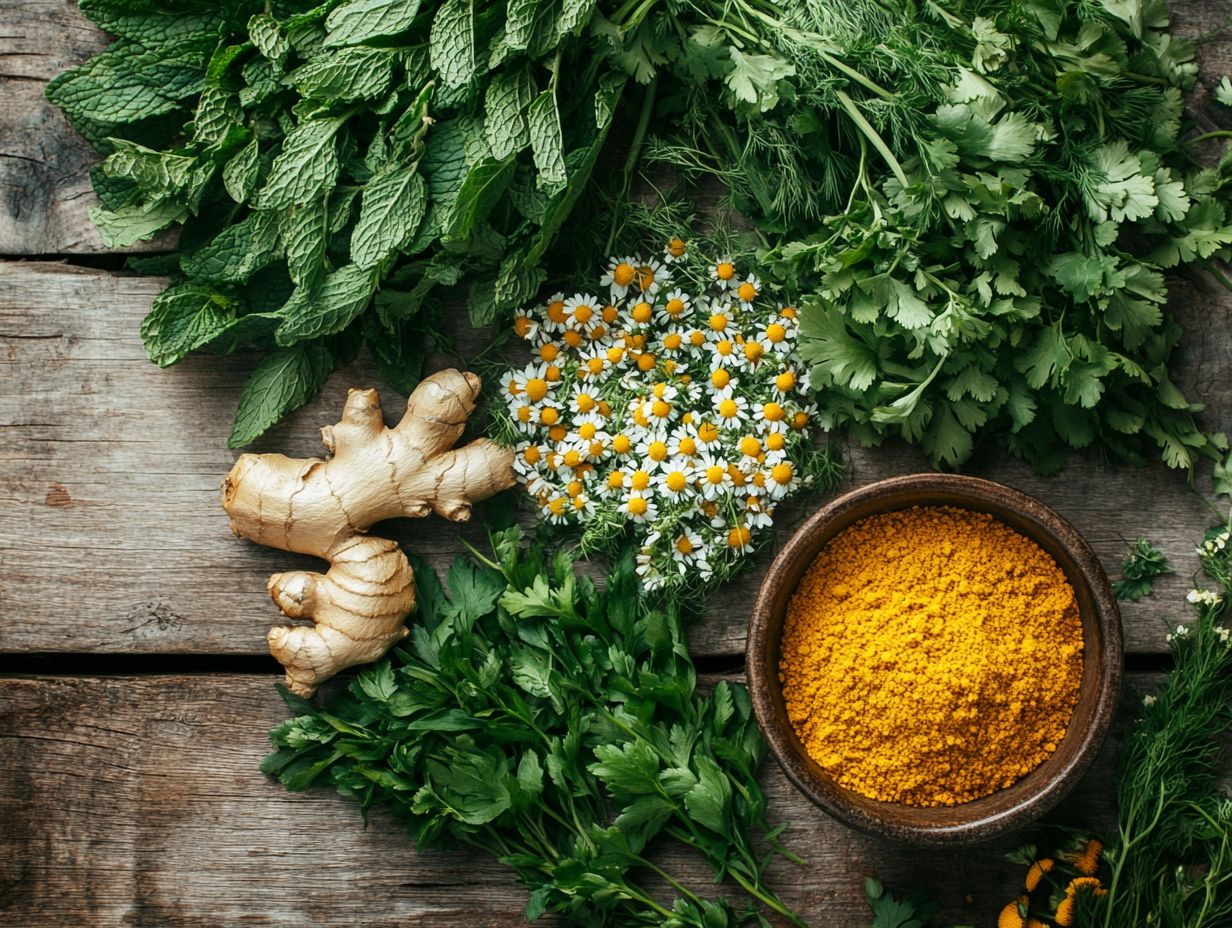
- Ginger is a powerful natural digestive aid that helps ease nausea, bloating, and other stomach discomforts.
- Peppermint has soothing properties that provide relief from stomach discomfort and digestive issues.
- Fennel is effective for reducing bloating and gas, making it helpful for those with digestive issues.
1. Ginger: A Natural Digestive Aid
Ginger, known scientifically as Zingiber officinale, has long been revered for its digestive benefits. It provides remarkable support for gut health and effectively addresses issues like nausea and bloating.
Its active compounds, particularly gingerol, have anti-inflammatory properties that enhance your overall digestive health. Ginger also boosts nutrient absorption and immune function.
The ability of ginger to alleviate nausea has captured attention, especially among pregnant women and those undergoing chemotherapy. It helps ease bloating and gas discomfort by promoting smoother digestive processes.
By improving blood circulation in your digestive tract, ginger ensures the efficient transport of essential nutrients throughout your body. It becomes an invaluable ally for anyone looking to elevate their digestive health.
2. Peppermint: Soothes Stomach Discomfort
Peppermint, or Mentha piperita, is celebrated for its soothing properties. It alleviates stomach discomfort and provides relief from heartburn.
This aromatic herb has long been embraced in herbal medicine for its ability to ease digestive issues such as gas and bloating. Its calming effect on the digestive tract makes it a favorite.
Incorporating peppermint tea into your daily routine can be a seamless way to enhance your well-being. Imagine enjoying a soothing cup every evening!
The menthol in peppermint acts as a natural relaxant for the muscles of your gastrointestinal tract, promoting smoother digestion. Peppermint tea may also help reduce headaches and improve concentration, making it a versatile addition to your regimen.
3. Fennel: Reduces Bloating and Gas
Fennel, especially its seeds, is renowned for its ability to reduce bloating and gas. This versatile herb alleviates discomfort and promotes overall gut health by improving digestion and nutrient absorption.
You ll discover delightful ways to incorporate fennel into your meals, from adding raw slices to salads to using it in soups and stews. Brewing fennel tea is another popular option, as it gently soothes the digestive tract.
Fennel also boasts impressive prebiotic properties, nourishing beneficial gut bacteria and supporting a balanced microbiome. Don’t wait start transforming your digestive health today!
4. Chamomile: Your Go-To for Nausea Relief!
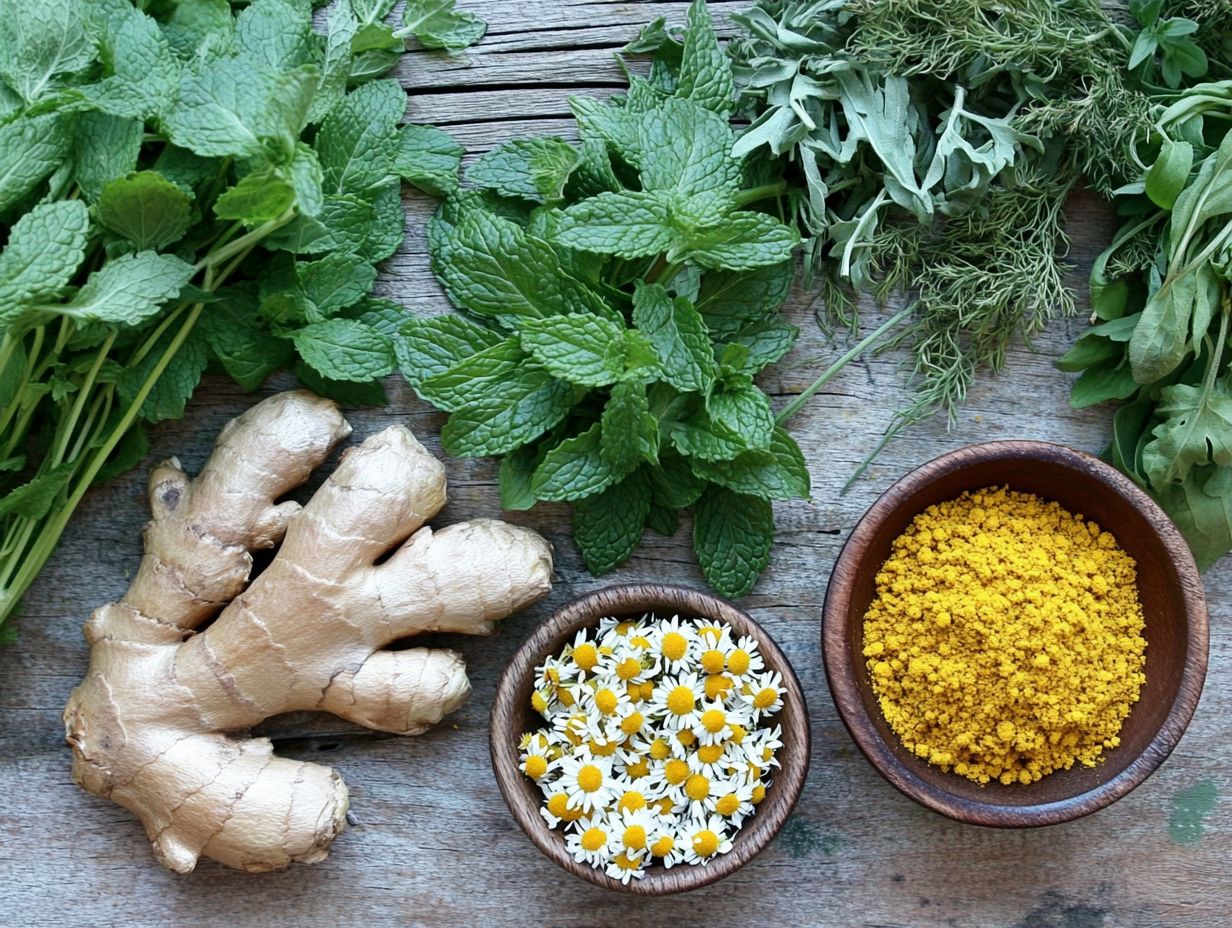
Chamomile has long been cherished for its calming effects. It is especially effective in alleviating nausea and indigestion that often accompany digestive issues.
This gentle herb is renowned for its anti-inflammatory properties, soothing an upset stomach and supporting overall digestive health. It’s a favored choice for those seeking natural remedies.
Enjoying this gentle herb is a treat! You can savor it as a warm, aromatic tea or choose supplements, making it effortless to weave into your daily routine.
Chamomile also helps reduce anxiety and enhance sleep quality, offering a holistic approach to well-being. Its mild sedative properties make it an excellent ally for anyone feeling stressed or overwhelmed.
Feel the calming effects of chamomile! It also boasts impressive antioxidant effects, which may help boost your immune system and promote skin health. This further solidifies its appeal as a comprehensive natural solution.
5. Turmeric: Anti-Inflammatory and Digestive Support
Turmeric, with its striking yellow hue, is celebrated for its potent anti-inflammatory properties and significant contribution to digestive health. It has established itself as a cornerstone in herbal medicine.
Packed with curcumin, the active ingredient in turmeric that gives it its health benefits, this remarkable spice not only helps alleviate gut inflammation but also enhances nutrient absorption and promotes overall well-being.
Don’t wait! Start adding turmeric to your meals today for a health boost! You can mix this spice into smoothies, soups, and curries, enriching your dishes with a warm, earthy flavor while elevating their nutritional value.
Explore turmeric-infused herbal teas as a soothing option for digestive relief. Research indicates that turmeric interacts positively with your gut microbiome, fostering a balanced environment that nurtures beneficial bacteria.
This interaction aids in digestion and may also bolster your immunity, highlighting the diverse advantages this spice offers for gut health.
How Can These Herbs Be Incorporated into a Diet?
Incorporating herbs like ginger, peppermint, fennel, chamomile, and turmeric into your diet can significantly elevate your digestive health and support your overall well-being, especially with herbal remedies for common digestive complaints.
You can enjoy these herbs in various forms, such as teas, capsules, or as vibrant ingredients in your meals. This offers a holistic approach to tackling digestive issues and enhancing nutrient absorption.
- Try adding ginger to your stir-fries or smoothies for a zesty kick that helps digestion.
- Peppermint, with its refreshing flavor, is delightful in tea or fresh in salads and desserts.
- Fennel seeds are fantastic when lightly toasted and sprinkled over roasted vegetables or incorporated into your bread recipes.
- Brew chamomile into calming nighttime teas, perfect for soothing your stomach.
- For turmeric, its vibrant color and health benefits make it an excellent addition to curries, soups, or golden milk drinks.
By combining these herbs, you not only boost your digestive function but also enhance their individual effectiveness when used together. Mixing turmeric and ginger in a soothing beverage gives an extra health kick!
What Are the Recommended Dosages for Each Herb?
Recommended dosages for herbs like ginger, peppermint, fennel, chamomile, and turmeric can vary based on your unique health needs and the effects you re aiming for. This allows you to reap optimal benefits while minimizing any potential side effects. It s wise to consult with a healthcare provider for personalized advice, especially if you have pre-existing digestive issues or chronic conditions.
For instance, you can enjoy ginger as a tea brewed from fresh root, typically using one to two grams daily. Capsules might suggest similar dosages. Peppermint often comes in oil or tea form, with dosages ranging from 0.2 to 0.5 grams per day. Fennel seeds can be consumed as a tea or in their whole form, with about two to three grams a day being a common recommendation.
Chamomile is usually savored as a calming tea, with one to two bags or one to two grams of dried flowers per day being just right. As for turmeric, it s often consumed in powdered form, with a typical recommendation of one to three grams daily, though this can vary depending on the extraction methods used.
Remember, moderation is key to avoiding adverse effects and fully unlocking the beneficial properties of these herbs.
Are There Any Potential Side Effects of Using These Herbs?
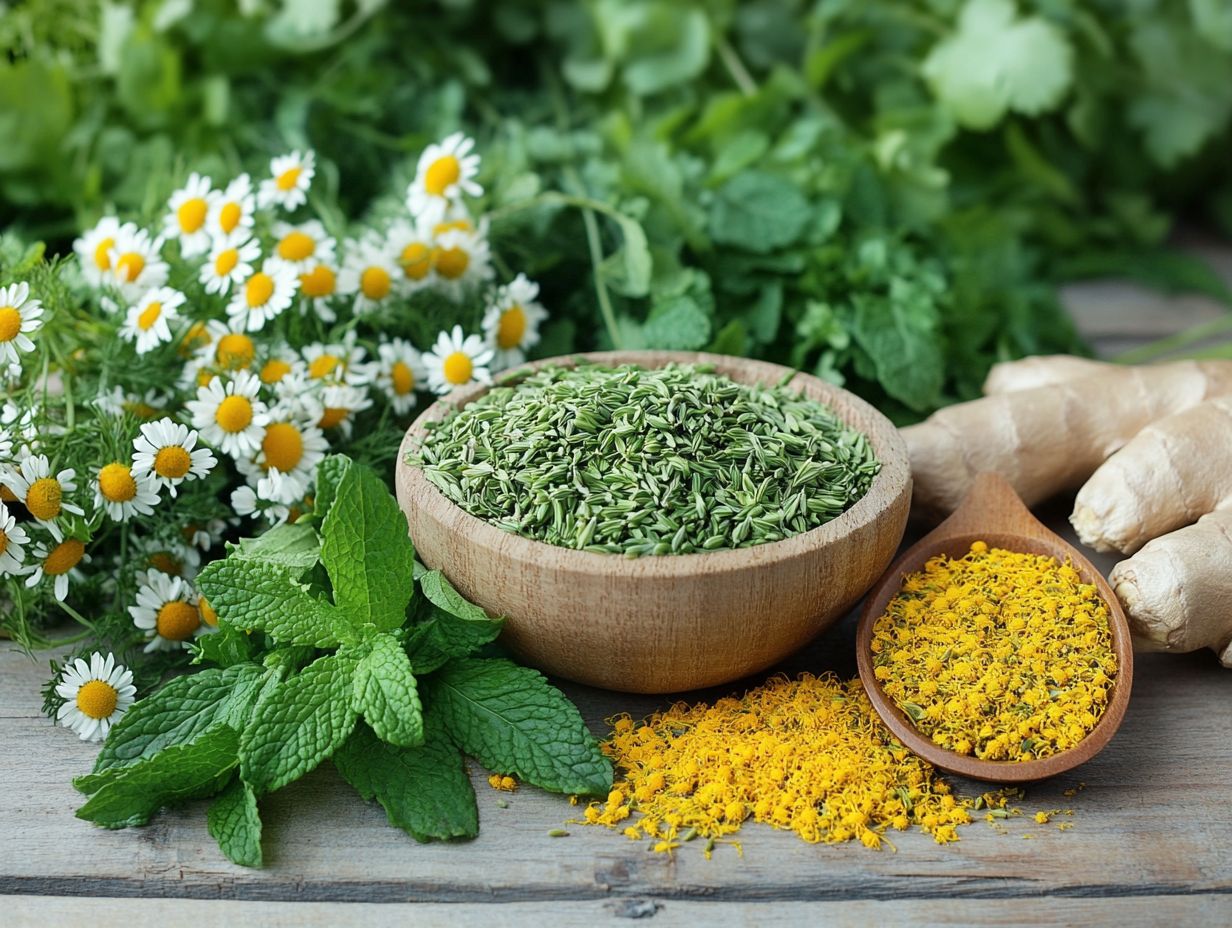
While herbs like ginger, peppermint, fennel, chamomile, and turmeric offer many health benefits, it’s important to be aware of potential side effects that could emerge from their use, particularly when consumed in excess. You might encounter common issues such as allergic reactions, digestive upset, or interactions with medications this highlights the importance of informed usage.
For example, indulging in excessive ginger can lead to heartburn or digestive discomfort. Overdoing peppermint can lead to headaches or exacerbate acid reflux. Fennel could spark allergic responses in some individuals. While chamomile is known for its calming effects, it may cause drowsiness or interfere with blood-thinning medications.
Turmeric, celebrated for its anti-inflammatory properties, also warrants caution, as it can lead to gastrointestinal issues for some.
Thus, it’s wise for you especially if you have underlying health conditions, are pregnant, or are taking specific medications to consult a healthcare provider before diving into the world of these herbs. Stay informed! It’s crucial to consult with a healthcare provider for a safe journey.
What Other Digestive Health Benefits Do These Herbs Offer?
Beyond their primary uses, herbs such as ginger, peppermint, fennel, chamomile, and turmeric offer a wealth of additional digestive health benefits that contribute to a balanced gut microbiome and elevate your overall wellness. Incorporating superfoods for healthy digestion can enhance these effects, as these herbs contain substances that help good bacteria grow, which is essential for maintaining robust digestive health and bolstering immune function.
Not only do these herbs nurture a thriving microbiome, but they also possess anti-inflammatory properties that soothe the gut lining. This alleviates discomfort and promotes optimal nutrient absorption. For instance, ginger has been well-documented for its ability to alleviate symptoms of nausea and indigestion. Peppermint works to ease bloating and gas by relaxing the digestive tract.
Fennel, often your go-to for combating flatulence, aids in the secretion of digestive enzymes, enhancing food breakdown. Chamomile doesn t just calm your stomach; it helps reduce stress, which can positively influence your digestive function. Meanwhile, turmeric s active compound, curcumin, plays an essential role in supporting liver health, further optimizing your overall metabolic processes.
Unlock the power of herbs for pain relief for your digestive health today, but remember to consult your healthcare provider for a safe journey!
Can These Herbs Be Used for Other Health Conditions?
Along with the benefits they offer for digestive health, herbs like ginger, peppermint, chamomile, and turmeric have garnered attention for their potential roles in addressing a range of health conditions, including chronic diseases such as inflammatory bowel disease and irritable bowel syndrome. Their therapeutic properties suggest that they may serve as supportive care for various ailments.
Ginger shows promise in alleviating nausea related to pregnancy and chemotherapy.
Peppermint may help relieve headaches and sinus congestion.
Chamomile is often recommended for its calming effects, potentially aiding those who grapple with anxiety or insomnia.
Turmeric is known for its anti-inflammatory properties and has been researched for its potential benefits in managing arthritis and boosting overall immune function.
However, despite the encouraging findings and anecdotal support, it’s crucial to always check with healthcare professionals before adding any of these herbs to your regimen. This ensures safety and appropriateness, tailored specifically to your individual health needs.
What Are Some Other Natural Remedies for Digestive Health?
In addition to ginger, peppermint, fennel, chamomile, and turmeric, there are numerous natural remedies that can effectively promote your digestive health, providing you with holistic alternatives. You might consider incorporating garlic, cinnamon, and dandelion root into your wellness routine. Each of these boasts unique properties that support gut function and alleviate digestive issues.
Garlic is renowned for its antimicrobial benefits, helping to balance gut bacteria.
Cinnamon works wonders for regulating blood sugar levels, which can potentially reduce gastrointestinal discomfort.
Dandelion root acts as a gentle laxative and stimulates liver function, promoting better digestion.
When combined, these natural remedies create a robust support system for your digestive tract. By weaving these varied options into your daily routine, you can enhance your overall gut health, leading to improved nutrient absorption and a more resilient digestive system.
Frequently Asked Questions
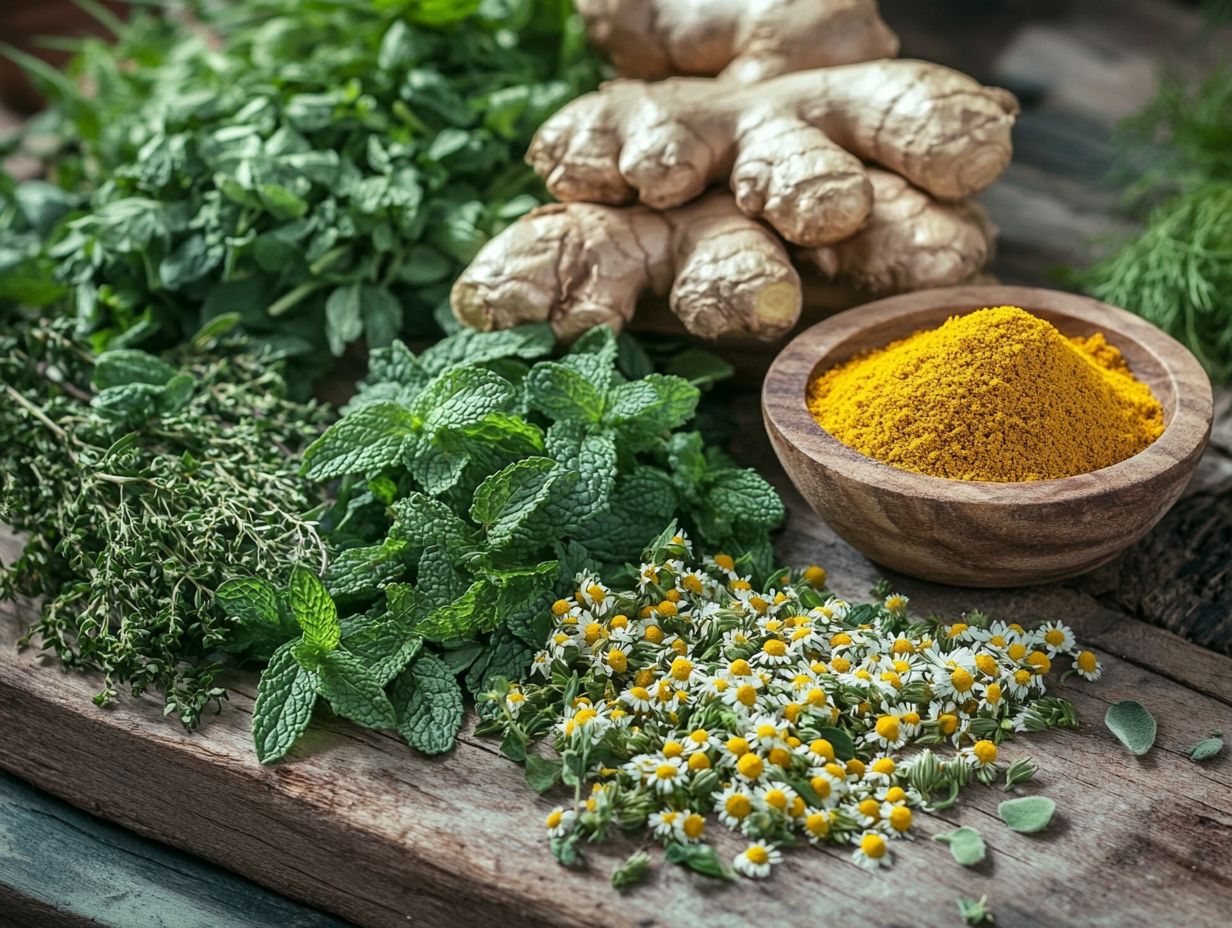
What are the 5 essential herbs for digestive health?
The 5 essential herbs for digestive health are ginger, peppermint, fennel, chamomile, and turmeric.
How does ginger aid in digestive health?
Ginger contains compounds that help stimulate digestion, reduce nausea and bloating, and ease stomach discomfort.
What benefits does peppermint offer for digestive health?
Peppermint has anti-inflammatory and antispasmodic properties that can help relieve symptoms of irritable bowel syndrome and other digestive issues.
Why is fennel beneficial for digestion?
Fennel contains a compound that relaxes the muscles of the digestive tract and reduces gas and bloating.
Can chamomile help with digestive problems?
Yes, chamomile has been shown to have anti-inflammatory and antispasmodic effects, making it effective for soothing digestive issues such as cramps and gas.
How does turmeric improve digestive health?
Turmeric contains curcumin, a compound with anti-inflammatory properties that can help ease symptoms of digestive disorders like ulcerative colitis and indigestion.


